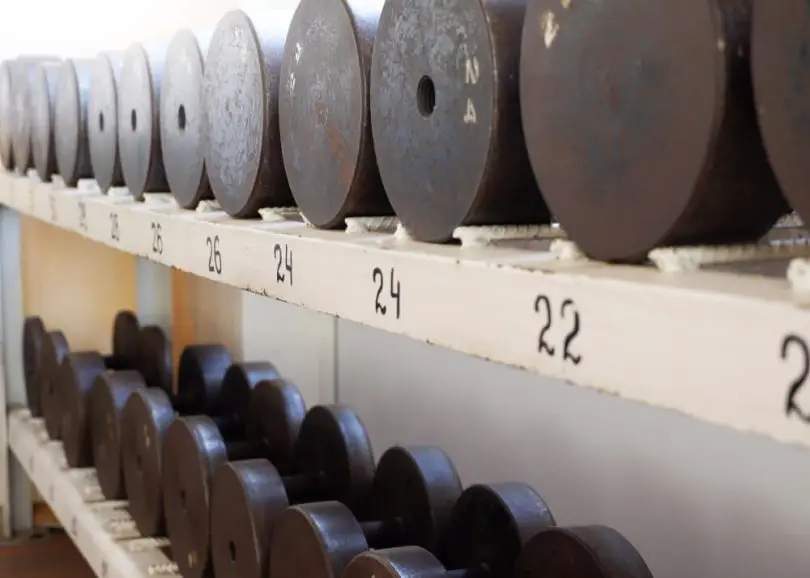Why Do Metal Weights Feel Heavier?
One of the best things about the gym is that it’s just you vs the weights and I’m sure many reading this have heard “philosophical” phrases saying no matter what life throws at you, a pair of 45s in the gym is always a pair of 45s.
If you’ve ever worked out at home and then at a variety of gyms, you’ve probably noticed that not all 45lb plates feel the same.
Some weights, no matter what the label says, actually feel heavier than others.
Metal (iron) plates serve as an excellent example of this. If you’re wondering why metal weights feel heavier, I’ll answer that question in this article and see if the weight you’re lifting is accurate or not.
What Makes Metal Weights Weigh More?
Because metal weights tend to feel heavier than rubber weights, you may have noticed this yourself. Do not be alarmed; you are not going insane for the reasons listed below. Metal weights, according to many, are noticeably heavier.
-
Iron weights are heavier
The first reason behind this could be that the iron weights are actually heavier
Scales can be used to test this, but be careful not to damage them. Iron and rubber plates can differ in weight by as much as five pounds, according to regular gym-goers. This is a big difference, but the quality and calibration of the weights is the most important factor.
Cheaper, economy-grade weights are not properly calibrated and can be significantly heavier or lighter than the number on the side indicates.
-
Rusty weights
There is also the possibility that the rusty weights could have a significant impact on the weight. When lifting several iron-weight plates, even if the rust is barely noticeable, it can add up quickly when the weight is added up due to oxidation
-
Diameter
The diameter of the plates themselves is an important consideration. Depending on the weight, metal weights are available in a variety of sizes.
A 45-inch diameter rubber plate is the only difference between rubber plates of the same thickness. Weight distribution and bar whip can benefit from this.
-
Barbell whip” effect
Due to the “barbell whip” effect, which occurs when more leverage is used to bend the bar, heavier deadlifts will feel lighter.
A lift like the barbell squat, for example, can be made much more difficult by using bar whip in the opposite direction of its intended purpose.
-
It’s in your head
Lastly, it’s possible that it’s all in your head. The design of the weights can affect how heavy the weight feels in your hands when you are carrying them around the gym.
Smaller metal plates, on the other hand, may appear less intimidating than larger ones. It also affects weight distribution, so play around with it to see what works best for you.
Are Iron Weights Heavier Than Rubber Weights?
In the case of high-quality weights, deviations are extremely limited. They can be calibrated to be extremely precise, but rubber and iron weights are very different.
It is possible for rubber weights to be several pounds lighter than they appear to be. In order to ensure that there is no difference between the two measurements, use a scale.
Iron weights can rust and become heavier as a result. Iron in the weight reacts with oxygen and water to increase the plates’ molecular weight, which is why this happens.
Rubber dumbbells can have a very different weight distribution than iron dumbbells, which are more commonly used. It can make a huge difference in how heavy the weight feels, even if the difference in weight is only a gram or two.
You can try this out for yourself by doing a set with one type of dumbbell and then repeating it with another type of dumbbell of the same weight. There is a lot of variation in how two dumbbells feel even if they are the same weight and have been tested on a scale.
It’s a lot like picking up a broom. You can lift a broom with just your wrist if you grab it in the middle. It’s nearly impossible to move it with just your wrist if you grab it at the end (opposite end to the brush). Dumbbell and weight plate designs are no exception.
What Causes Weights at Home to Feel Heavier Than Those at the Gym?
Weights can feel heavier at home for a variety of reasons. For example, if we’re talking about barbells, you might be working out with a lighter barbell than you realize. If you prefer a barbell that is lighter or shorter than the Olympic standard of 20 kg (about 45 lbs), you’re not alone.
The weights used in a quality gym will be of a well-known brand. Weight plates with different colors mean they are Olympic regulation plates and must be calibrated to an exact weight, if you’ve ever noticed that (very little room for error).
There is a lot of variation in the weight of regular weight plates because they aren’t regulated as tightly.
Buying weights for a home gym could result in weights that are heavier than stated on the plates or dumbbells. It’s great for saving money, but terrible for keeping track of your strength and lifting progress.
-
Weights can also be mislabelled on machines like the cable machine.
Often, people think they’re lifting 50kg in the overhead triceps extension when they’re actually lifting 50 pounds. Pay attention to how the weights feel, rather than the numbers printed on the plates. This will give you a good idea of what you’re dealing with.
However, it could all be a trick of the mind. Aside from the distractions at home, the gym is the only place where you can focus solely on one thing: your workout.
You may also have a smaller space at home, which can play a role. Or I t’s also possible that you’ve warmed up more at the gym.
Summary
Metal weights may feel heavier than other materials (vinyl, rubber, concrete) because of your perception of their weight. In terms of appearance, iron weights are a lot heavier than other weights, but it’s not all in your head.
For a variety of reasons, metal weights often feel heavier than other types of weights. There are many factors that can affect how heavy a weight feels when being lifted, including the weight’s design, rust, density, and diameter, and it is unquestionably true that metal weights can feel heavier.
For the most part, the difference is negligible, but if you’re having a hard time with iron weights and can’t get past your physiological perspective, it’s time to weigh them.







